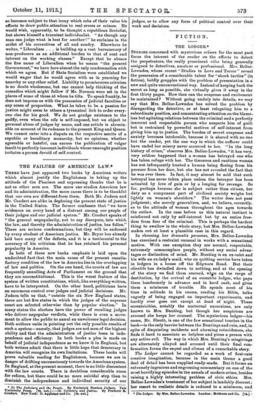THE FAILURE OF AMERICAN LAW.*
THERE have just appeared two books by American writers which almost justify the Englishman in taking up the attitude of the Pharisee and expressing thanks that be is not as other men are. The more one studies American law and its administration, the more cause there is to be thankful that our own are different from them. Both Mr. Judson and Mr. Coudert are alike in deploring the present state of justice in the United States. The former confesses that " we have evidences on every hand of a distrust among our people of their judges and our judicial system." Mr. Coudert speaks of " the general unpopularity, not to say disrepute, into which the law, and thereby the administration of justice, has fallen." These are serious condemnations, but they will be endorsed by every student of American justice. Mr. Bryce has already laid bare many of the defects, and it is a testimonial to the accuracy of his criticism that he has retained his personal popularity in America.
In both of these new books emphasis is laid upon the undoubted fact that the main cause of the present unsatis- factory condition of the law in America lies in the overlapping of law and politics. On the one hand, the courts of law are frequently annulling Acts of Parliament on the ground that they are unconstitutional. This is the worst feature of the system of written constitutions, which, like everything written, nave to be interpreted. On the other hand, politicians have an enormous control over judges and judicial decisions. Mr. Judson tells us that, " outside the six New England states, there are but five states in which the judges of the supreme court are selected otherwise than by popular election." In many states the electors have the power of recalling judges who deliver unpopular verdicts, while there is even a move- ment to allow the public to annul an unwelcome legal decision. Both authors unite in pointing out the only possible results of such a system—namely, that judges are not men of the highest ability and that the administration of justice loses in inde- pendence and efficiency. In both books a plea is made on behalf of judicial independence as we know it in England, but both writers admit that there is little hope that democracy in America will recognize its own limitations. These books will prove valuable reading for Englishmen, because we are in danger of drifting unconsciously towards the American system. In England, at the present moment, there is no little discontent with the law courts. There is doubtless considerable room for reform, but there could be no more suicidal step than to diminish the independence and individual security of our
• (1) The Judiciary and the People. By Frederick Newton Judson. Yale University Press. [6s. net.]—(2) Certainty and Justice. By Frederic R. Coudert. New York: D. Appleton and Co. [68. net.]
judges, or to allow any form of political control over their work and decisions.














































 Previous page
Previous page